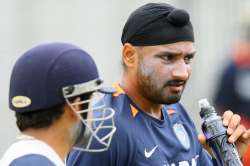Finger spinners need to reinvent to remain relevant in ODIs: Harbhajan Singh
Wrist spinners Kuldeep and Chahal have become India's preferred choices in the shorter formats over the last 18 months, while Jadeja and R Ashwin have gone down in the pecking order.

Senior off-spinner Harbhajan Singh feels Ravindra Jadeja is still in with a chance to make India's World Cup squad on the back of his all-round skills but to survive purely as a finger spinner, he will have to improvise.
Wrist spinners Kuldeep Yadav and Yuzvendra Chahal have become India's preferred choices in the shorter formats over the last 18 months, while Jadeja and R Ashwin have gone down in the pecking order.
Harbhajan, who has played three 50-over World Cups including two finals, is still not ready to count Jadeja out even though he was not a part of the playing XI during the just-concluded ODIs in New Zealand.
"If you remember, during the 2017 Champions Trophy, the weather in UK was hot and humid. So, if conditions are same, Jadeja could still be used as a package, if the opposition team has five to six right-handers in their line-up.
Play him as No.6 with Hardik Pandya as No.7. Also he is still your best fielder," Harbhajan told PTI during an exclusive interview.
One of the finest off-spinners of his generation, Harbhajan agreed that finger spinners' stocks are down compared to wrist spinners.
"It's simple, wrist spinners have three basic variations. Leg-break, googly (wrong-un) and the flipper. If you add top spinner, which is rarely used in ODIs, it becomes four," the 38-year-old with 417 Tests and 269 ODI wickets, said.
"Now come to an off-spinner. If you don't have an effective doosra, the off-breaks become predictable and good batsmen will line you up for slogging. Even Nathan Lyon was struggling in the ODIs and he is a classical off-break bowler.
"Unless you have the ball that leaves the right-hander, it is very difficult to dislodge the leg-spinners from shorter formats."
The veteran also feels that worldwide, there has been a decline in the quality of batting against spin bowling, especially the wrist spinners.
"The art of reading the spinners out of the hand is on the decline. Most of the overseas batsmen, if you see, are trying to read wrist spinners after pitching and that's dangerous," he lamented.
"However, Kuldeep and Chahal have been very consistent. Just check their pitch map through the 40-odd games and the length has been very accurate.
But unlike Indian batsmen, who are masters at reading the hands, it is not the case with most of the overseas batsmen," Harbhajan explained.
"I will give you an example. Kuldeep and Chahal would have had a tough time if they had to bowl to Shikhar Dhawan and Rohit Sharma as both are very good players of spin bowling."
But Rohit has had his share of problems against leg-spinners?
"Yes, that's just in a few IPL games during initial overs of an innings. If it's a 50-over match and a player of Rohit's calibre is batting against the wrist spinners, he has that quality that he will hit him to any part of the ground. Whenever and wherever he wants to."
"Or for that matter Gautam Gambhir, who is another terrific player of spin bowling. He was such a fabulous player as he would watch it from the hand and play late with the spin," he reasoned.
Kedar Jadhav has been India's specialist finger spinner in the 50-over format during the past two years (when not injured) and his low bounce makes him a useful bowler, said Harbhajan.
"Kedar's low bounce makes him a difficult bowler. In any case, he is short and with that side-arm action, the balls keep very low. He grips the ball in such a way that, it would never hit the seam and so there won't be true bounce available to hit the deliveries through the line.
"The ball will never hit the 'sweet spot' of the bat and so the batsman will not get the required elevation," he signed off.